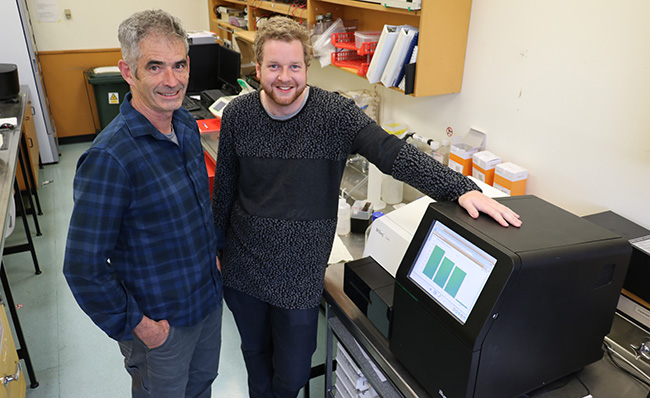 Wednesday 11 April 2018 10:04am
Wednesday 11 April 2018 10:04am
Dr Parry Guilford (left) and PhD student Christopher Hakkaart.
A University of Otago Biochemistry PhD student is credited with saving lives, thanks to his new research finding a genetic mutation that is linked to high rates of Māori stomach cancer.
Biochemistry PhD student Christopher Hakkaart's research, which has just been published in the journal Familial Cancer, has found mutations within the CDH1 gene that are passed down the family line could account for 13 per cent of cases of advanced diffuse stomach cancer within Māori.
It is a startling statistic for Māori, whose registration rates for stomach cancer are more than three times that of non-Māori (15.8 v 4.8 people per 100,000 respectively).
There are two main types of stomach cancer: diffuse-type stomach cancer and intestinal-type stomach cancer. Mr Hakkaart's research, whch used DNA sampling from 94 Māori gastric cancer patients, focused on diffuse-type stomach cancer.
This cancer-causing gene is the same that led to award-winning Māori musician Stan Walker undergoing surgery to remove his stomach. Mr Walker and his mother both share a mutation in the CDH1 gene.
The research is the first of its kind to examine how many gastric cancers can be attributed to germline CDH1 mutations within a specific ethnic group.
Mr Hakkaart says the research is helping them understand how these mutations can affect what they see in the cancer registry.
“With the discovery of CDH1 mutations as a cause of hereditary diffused gastric cancer, we've been able to identify families that carry these mutations and are at a high risk of diffuse-type stomach cancer,” Mr Hakkaart says.
“By identifying mutation carriers we can identify members of their families who are also at a really high risk and offer them interventions before they would have presented with late stage disease.”
Among the recommendations in the release are calls for Māori who present with early-onset diffuse stomach cancer to get screened for CDH1 gene mutations, and let other members of their families know to do the same.
University of Otago Professor of Biochemistry Parry Guilford says there are very few examples of ethnic groups where the rate of cancer is high because of a genetic background.
“Thirteen per cent is not the majority, but it's still a surprisingly high proportion of cases in the Māori population that are caused by germline genetic variations,” Professor Guilford says.
Professor Guilford, who is the Director for the University's Cancer Genetics Laboratory, says it is very unusual for PhD students to be saving lives, but that is exactly what Mr Hakkaart is doing.
“He found a new mutation in one of the Māori families here we're concerned about, but also some families in Chile who have got mutations in this gene as well.”
“Because of his work, people in those families here and in Chile are going to live.”
For more information, please contact:
Christopher Hakkaart
Centre for Translational Cancer Research
Email: christopher.hakkaart@otago.ac.nz
Professor Parry Guilford
Director, Cancer Genetics Laboratory
University of Otago
Email: parry.guilford@otago.ac.nz
A list of Otago experts available for media comment is available elsewhere on this website.
Electronic addresses (including email accounts, instant messaging services, or telephone accounts) published on this page are for the sole purpose of contact with the individuals concerned, in their capacity as officers, employees or students of the University of Otago, or their respective organisation. Publication of any such electronic address is not to be taken as consent to receive unsolicited commercial electronic messages by the address holder.
